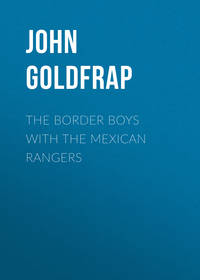 полная версия
полная версияThe Boy Aviators in Nicaragua; or, In League with the Insurgents
“When do you expect those wonderful boys of yours?” he went on, “whose doings, you see, even we have heard of in this out-of-the-way corner of the earth.”
“Indeed, Señor Chester,” said the young woman at the yellow old Don’s side, “you must bring them to see us the very minute they arrive. My husband – Don Ramon – ” she sighed.
“Brave Don Ramon,” supplemented her father, “a man in the field fighting at the head of his troops for his country is to be envied. The name of General Pachecho was not unknown when I was younger, but now – ” he broke off with a quizzical smile full of the pathos of the involuntary inactivity of age.
“When Don Ramon returns triumphant from the field he can do better than merely discuss his favorite subject of aviation with my boys,” proudly remarked Señor Chester, “he can see the Golden Eagle itself. Let us hope that he will introduce it into the new army of the hoped for republic of Estrada.”
“Viva Estrada!” cried the girl, and her aged father; caught with common enthusiasm at the name of Zelaya’s foe.
“I only wish, though,” said Señor Chester, with a half sigh, “that the country was more settled. For us it is all right. But, you see, their mother – ”
“Ah, the heart of a woman, it bleeds for her sons, is it not so?” cried Señora Ruiz, in her emotional Spanish manner.
“But, Señor Chester, never fear,” she continued. “My husband will not let the troops of Zelaya drive Estrada’s forces as far to the east as this.”
“But this is the hot-bed of the revolutionary movement. Zelaya has declared he will lay it waste,” objected the planter.
“While Don Ramon Ruiz leads the reactionary troops,” proudly retorted the woman with feverish enthusiasm, “Zelaya will never reach Restigue or La Merced or the Rancho del Pachecho.”
“Where the torch is laid, who can tell how far the fire will run?” remarked the Don, with true Spanish love of a proverb.
“Oh, don’t let’s think of such things!” suddenly exclaimed Señora Ruiz, “we revolutionists will be in Managua in a month. Oh, that Zelaya – bah. He is a terrible man. I met him at a ball at Managua a year ago. When he took my hand I shivered as if I had touched a toad or a centipede. He looked at me in a way that made me tremble.”
Both his visitors declined Señor Chester’s courteous invitation to enter the dark sala and partake of a cup of the native chocolate as prepared by his mocho, or man servant.
“It grows late, Señor,” said the old Spaniard, “like my life the sun is declining. Oh, that I should have lived to have heard of the death of brave Moneague! You know of it?”
A nod from Chester assured him. He went on:
“When he went to New York alone to collect revolutionary funds, I told them it was foolish, but I was old, and there were many who would not listen. Peste! how foolhardy to give him the parchment with the mystic plans on it. The secret of the lost mines of King Quetzalcoatl are worth more than one man’s life and have indeed cost many.”
“Do you mean that Dr. Moneague had the plans of the mines with him when he was killed?” quickly asked Señor Chester. “I always thought the mines were a native fable.”
“The young think many things that are not so,” was the old Don’s reply. “No, my son, Dr. Moneague did not have the plans of the mines themselves but he had what was as good, he had the bit of parchment on which – in the lost symbols of the Toltecs – the secret of the long lost paths by which the precious metals were brought to the coast was inscribed. He spent his life at this work of deciphering the hieroglyphics of that mysterious race, and he solved them; but, brave man, he was willing to yield up the secret of his life work if for it he could get money enough to save his country. You knew that his visit to New York was to see if he could not induce one of your American millionaires to give us funds?”
“I guessed it,” was the brief reply. “But why, if he knew the secret of the mines, did he not go there himself?”
“He went there once; but you who have lived long in this country know that, under Zelaya’s cruel rule he would have been worse than foolhardy to have brought out any of the miraculous wealth stored there. If Zelaya had heard of it he would have wrung the secret from him by torturing his children before his eyes.”
Shaking with excitement the old patriot gave a querulous order to the aged coachman to drive on, and waved his thin yellow hand in farewell. Señor Chester stood long watching the dust of his visitor’s carriage as it rose from the banana-fringed road that zig-zagged down the mountain side. At last he turned away and entering the house emerged a few minutes later with a light poncho thrown over his shoulders.
The chill of the breeze that sets seaward in the tropics at twilight had already sprung up and in the jungle the myriad screaming, booming, chirping voices of the jungle night had begun to awaken.
Chester made his way slowly to a small, whitewashed structure a short distance removed from the main hacienda. As he swung open the door and struck a light a strange scene presented itself – doubly strange when considered as an adjunct of a banana planter’s residence. On shelves and racks extending round the room were test tubes and retorts full and empty. The floor was a litter of scribbled calculations, carboys of acid, broken bottles, straw and in one corner stood an annealing forge. Here Señor Chester amused himself. He had formerly been a mining engineer and was as fond of scientific experimentation as were his sons.
Stepping to a rack he took from it a tube filled with an opaque liquid. He stepped to the doorway to hold it up to the fading light in order to ascertain what changes had taken place in its contents since the morning.
He almost dropped it, iron-nerved man as he was, as a piercing shriek from the barracks inhabited by the plantation workers rent the evening hush of the plantation.
The noise grew louder and louder. It seemed that a hundred voices took up the cry. It grew nearer and as it did so resolved itself into its component parts of women’s shrill cries and the deep gruff exclamations of men much worked up.
Suddenly a man burst out of the dense banana growth that grew almost up to Señor Chester’s laboratory. He was a wild and terrifying figure. His broad brimmed straw hat was bloodied and through the crown a bullet had torn its way. A black ribbon, on which was roughly chalked “Viva Estrada!” hung in a grotesque loop at the side of his face.
His clothes, a queer attempt at regimentals consisting of white duck trousers and an old band-master’s coat, hung in ribbons revealing his limbs, scratched and torn by his flight through the jungle. He had no rifle, but carried an old machete with which he had hacked his way home through the dense bush paths.
The master of La Merced recognized him at once as Juan Batista, a ne’er-do-weel stable hand, who had deserted his wife and three children two weeks before for the patriotic purpose of joining Estrada’s army, and incidentally enriching himself by loot. He had attached himself to General Ruiz’s division.
“Well, Juan! Speak up! What is it?” demanded his master sharply. Juan groveled in the dust. He mumbled in Spanish and a queer jargon of his own; thought by him to be correct English.
“Get back there!” shouted Señor Chester to the crowd of wailing women and scared natives from the quarters that pressed around. They fell back obediently.
“What is all this, Blakely?” asked Chester impatiently, as Jimmie Blakely, the young English overseer, strolled up as unruffled as if he had been playing tennis.
“Scat!” said Jimmie waving his arm at the crowd and then, adjusting his eyeglass, he remarked:
“It seems that Estrada’s chaps have had a jolly good licking.”
“What!” exclaimed the planter, “this is serious. Speak up, Juan, at once. Where is General Ruiz?”
It was with a sinking heart that Chester heard the answer as the thought what the news would mean to the radiant beauty he had been talking with but a short time before, flashed across his mind.
“Muerto! muerto!” wailed the prostrate Juan, “dead! dead!”
At this, although they didn’t understand it, the women set up a great howl of terror.
“Oh Zelaya is coming! He will kill us and eat our babies! Oh master save us – don’t let Zelaya’s men eat our babies.”
The men blubbered and cried as much as the women, but from a different and more selfish reason.
“Oh, they will kill us too and spoil all our land. The land we have grown with so much care,” they bemoaned in piercing tones, “moreover, we shall be forced to join the army and be killed in battle.”
“Blakely, for heaven’s sake take that bit of glass out of your eye, and get this howling mob out of here!” besought Chester desperately. “If you don’t I’ll kill some of them myself. Here you, get up,” he exclaimed bestowing a most unmerciful kick on the still prostrate Juan. “Oh, for a few Americans – or Englishmen,” he added, out of deference to Blakely.
“Couldn’t do a thing with them without the eyeglass, Mr. Chester,” drawled the imperturbable Blakely, “they think it’s witchcraft. Don’t twig how the dickens I keep it in.”
“All right, all right, meet me here at the house and we must hold a council of war, as soon as you’ve got them herded safe in the barracks,” impatiently said Chester, turning on his heel.
“Now come on, you gibbering idiots,” shouted the consolatory Briton at his band of weeping men and women, “come on now – get out of here, or I’ll eat your blooming babies myself – my word I will,” and the amiable Jimmie put on such a terrifying expression that his charges fled before him too terrified to make any more noise.
Out of sight of the governor, however, the Hon. Jimmie’s careless manner dropped.
“Well, this is a jolly go and no mistake;” he muttered, giving the groveling Juan a kick, where it would do the most good, “well, Jimmie – my boy – you’ve always been looking for a bit of row and it looks as if you’d jolly well put your foot in it this time – eh, what?”
While all this transpired on the ranchero El Merced, the Aztec with our heroes on board surprised everybody in Greytown, and no one more than her captain, by arriving there ahead of time. Just about the time that the Hon. Jimmie was herding his weeping charges to the barracks, her mud-hook rattled down and she swung at anchor off the first really tropical town on which the Boy Aviators’ eyes had ever rested.
CHAPTER III.
BILLY BARNES OF THE PLANET
Before sun up the next day there was a busy scene of bustling activity at the plantation of La Merced. The bustle extended from the hacienda to the barracks, – the news of the arrival of the Aztec having been brought to the estancia the night before by a native runner.
Old Matula, Señor Chester’s personal mocho had been down at the stables since the time that the stars began to fade urging the men, whose duty it was to look after the horses, to greater activity in saddling up the mounts, which his master, Jimmie Blakely, and their cortege needed in their ride to the coast to meet the boys.
The native plantation hands, as volatile as most of their race had forgotten the events of the preceding night in their child-like excitement at the idea of the arrival of The Big Man Bird, as they called the Golden Eagle; this being their conception of the craft gained after numerous consultations of Señor Chester.
Even Juan was strutting around the quarters and posing as a wounded hero, to the great admiration of his wife and the other women who entirely forgot that the night before he had appeared anything but a man of arms, and that his wife had subsisted mainly on the Señor Chester’s charity, since his desertion of her to become a patriot.
Jimmie Blakely and Señor Chester had sat far into the night talking over the situation, and it had struck midnight before they arrived at the conclusion that it would be inflicting a needless shock to inform Señora Ruiz of Juan’s report of her husband’s death until some sort of confirmation had been obtained. Fate, however, took the painful task out of their hands. The gossipy servants who had heard Jose’s lamentations lost no time in conveying the news to the estancia of Señor Pachecho. Señora Ruiz received the report of her husband’s death bravely enough while the servants were in the room, but after they had left she fell in a swoon and speedily became so ill that the old doctor at Restigue had to be routed out of bed and driven at post haste in a rickety volante to Don Pachecho’s home.
After a hasty snack – a la Espagnole – the real breakfast in the tropics not being taken till eleven o’clock or so – the master of La Merced and Blakely mounted their horses and set out at top speed for Greytown.
“I’ve got my own ideas of welcoming the boys to Nicaragua,” confided Mr. Chester to his overseer as they put spurs to their mounts, “I ordered a bonga to be in readiness for us as soon as the Aztec arrived. I guess a trip through the surf in one of those will astonish them, eh?”
“I should jolly well think so,” replied the Hon. Jimmie, screwing his monocule more firmly in his eye.
The young Britisher was immaculate in khaki riding breeches, long gray coat and yellow puttees. The admired and feared eyeglass, to which he owed so much of his power over the natives, was gleaming firmly from his face, nor did the rapid pace at which the rough-gaited horses were urged over the road, affect its equilibrium. To save time Mr. Chester had elected to take a trail instead of the main road. By doing this they cut off at least ten miles of the distance. It was a wild looking cavalcade that galloped along through clouds of dust over the none too sure footing of the rock-strewn trail. Behind Mr. Chester and Jimmie rode old Matula and the redoubtable Jose. The latter proudly wore about his classic brow a white bandage – in token of his being a hero and wounded. Both Jose and Matula led after them extra ponies for the use of the boys in the ride back to La Merced.
Bringing up the rear was a particular friend of Jimmie’s mounted on a razor-backed, single-footing mule that somehow managed to get over the ground as fast as the other animals and without any apparent exertion. Jose’s friend was a peculiarly villainous-looking old Nicaraguan Indian, who eked out a scanty living at rubber cutting – that is, slashing the rubber trees for their milk and carting the product in wooden pails to the coast.
He had arrived at the ranchero a few days before and not finding Jose there, the patriot being at the front, had just hung around after the easy fashion of the country to wait for him. The clothes of this old scarecrow, who by the way answered to the name of Omalu, consisted of coffee bags all glued over with the relics of countless tappings of the rubber tree. As he bestrode his mule his legs stuck out from his gunny bag costume like the drumsticks of a newly-trussed fowl.
Both Mr. Chester and Jimmie were armed. The former carried, besides his navy pattern Colt, a cavalry carbine slung in a holster alongside his right knee. Jimmie had strapped to a brand new cartridge belt an automatic revolver of the latest pattern. In addition to these weapons Jose and Matula carried their machetes, without which a native of any Central American country will in no wise travel, and old Omalu regarded, with a grin of pride on his creased face, his ancient Birmingham matchlock – commonly known as a gas-pipe gun.
As the cavalcade clattered into the dusty palm-fringed port of Greytown, with its adobe walls and staring galvanized iron roofs, the first launch from the Aztec was just landing passengers at the end of the new, raw pine wharf recently built by the steamship company. Before this all landings had been made through the surf, as Mr. Chester intended to land the boys.
The owner of La Merced and his party halted to watch the group of new arrivals making its way down the pier. Among the first to put his foot ashore was the black-bearded man who had such a narrow escape of missing the steamer in New York.
He looked very different now, however, except for his heavy face and suspicious quick glances. He wore spotless white ducks, of which he had purchased a supply a few days before, at the first tropic port of call the Aztec made. On his head was a huge Panama hat of the finest weave. In his hand he still gripped the black leather bag that he had caused such a fuss about in New York. It looked very incongruous in contrast to his fresh South American attire.
“General Rogero!” exclaimed Mr. Chester, as the black-bearded man came abreast of the little party. Hearing the name the person addressed looked up quickly.
“Ah, Señor Chester,” he exclaimed, displaying a glistening row of teeth beneath his heavy moustache, “how strange that you should be the first person I should meet after my little voyage to your delightful country. How goes it at the Rancho Merced?” He seemed purposely to avoid the important events that were transpiring.
Mr. Chester assured him that rarely before had the season promised better. The rains had ceased early and the crops looked as if they would be exceptionally heavy.
While they talked a barefooted messenger from the telegraph office in the iron railroad station slouched up to them.
“For you, General,” he said, saluting as he handed the bearded man a pink envelope.
With a swift “pardon” Rogero ripped open the envelope the messenger had handed him. From the time it took him to read it it was of greater length than the ordinary wire and he raised his eyebrows and exclaimed several times as he perused it.
When at length he looked up from it his face had lost the almost smug expression it had worn before. In its place there had come a manner of contemptuous command very thinly veiled by a sort of sardonic politeness.
“As you probably know,” he said, “and as this telegram informs me, the insurgent forces under the renegade Estrada were beaten back two days ago at El Rondero,” he looked insolently from under his heavy lids at the American planter to observe the effects of his words upon him.
For all the effect it had on Mr. Chester however, the words might as well have been directed at a graven image.
“Well?” he said, taking up the thinly disguised challenge flung at him by Rogero.
“Well,” sneered Rogero, “I simply thought it might be of interest to you to tell you that you are regarded at Managua as renegado. I may also inform you that to-day at sunrise the two captured Americans suspected of being connected with the revolutionaries were shot down like – ”
Whatever General Rogero might have been going to add he stopped short as Mr. Chester bent his angry gaze on him.
“What!” exclaimed the latter, “shot down without a trial – without an opportunity to explain. Zelaya will suffer for this.”
“That remains to be seen,” sneered Rogero, selecting a cigarette from a silver case and lighting it with calm deliberation. “What I have to say to you is in the nature of a warning, Señor. ‘Verbum sapiente,’ you know.”
“I can dispense with your advice, Señor,” cut in Mr. Chester.
“At present perhaps – but we may meet later and under different circumstances. Remember, Señor, that General Rogero of President Zelaya’s army shows no mercy to those who choose to ally themselves with dogs of rebels. Whether they are American citizens – or British,” he added with a look of scorn at Jimmie, “it makes no difference. A bullet at sunrise answers all questions. – Adios Señores.”
He raised his hat with an abrupt gesture, and with a sharp “Venga,” to an obsequious orderly from the barracks, who had just arrived with a horse for him, the general swung himself into the saddle and rode off to the Hotel Gran Central de Greytown.
As the general cantered off in a scattering cloud of dust, a youth who had landed from the launch at the same time, stepped up to Mr. Chester and his companion. He looked as if he might have walked off the vaudeville stage. Over one shoulder was slung a camera, from the other depended a canteen. A formidable revolver was strapped at his waist, and a pith helmet with a brilliant green cumer-bund sat low on his reddish hair. While the general had been uttering his sinister threats this figure had been busy taking snapshots of everything from the gallinazos or carrion buzzards that sat in long rows along the ridges of the galvanized roofs to the old women under huge umbrellas, who dispensed evil-looking red and yellow candy from rickety stands.
“I beg your pardon,” he said, placing his hand on the pommel of Mr. Chester’s saddle. “Would you mind telling me who that gentleman is with whom you have just been speaking?”
As he raised his face he disclosed a plump, amiable countenance ornamented by a pair of huge round spectacles.
“I know this is unusual,” he hurried on apologetically, “but I’m Barnes – Billy Barnes of the New York Planet, – correspondent, you know.”
“Well, Mr. Barnes, if you are a correspondent you will have a lot of opportunities to meet General Rogero before this little trouble is over,” replied Mr. Chester, in an amused tone.
The effect of this reply on Mr. Barnes of the Planet, was extraordinary. He blew his cheeks out like a frog and executed a sort of double shuffle. He gazed at Mr. Chester in a portentous way for a few seconds and then sputtering out: – “You say that’s General Rogero?” then, with the cryptic words:
“Joseph Rosenstein, diamond salesman, eh? – oh Lord, what a story!” he dashed off in the direction the general’s horse had vanished.
“That young man is either insane or the sun has gone to his head,” commented Mr. Chester, as both he and Jimmie watched young Mr. Barnes’s fat little legs going like pistons bearing him toward the Hotel Gran Central.
“He’s a jolly queer sort of a cove,” was the amiable Jimmie’s comment, “a bit balmy in the crumpet, I should say.”
Any explanation of the meaning of “Balmy in the crumpet” on Jimmie’s part, was cut short by a native who ran from midway down the wharf and approaching Mr. Chester, rapidly muttered a few words of corrupt Spanish.
“He says the bonga is ready,” said Mr. Chester, turning to Jimmie – “come on. Remember I haven’t seen my boys for a year or more.”
They hurried down the wharf leaving Matula, Jose and old Omalu behind to watch the horses. Alongside the pier, riding the heavy swells like a duck, lay a peculiar type of boat about thirty feet long, called by the Nicaraguans, a bonga. It was carved out of a solid log of mahogany and painted a bright glaring red inside and out. They clambered down into it by a ladder formed of twisted jungle creepers and a few minutes later were skimming the smooth green swells that lay between them and the Aztec.
CHAPTER IV.
THE TWO-FINGERED MAN
The bonga, urged along by her two peaked sails, ran alongside the Aztec, a quarter of an hour later. The boys were leaning over the rail looking very natty in neat, white duck suits and Panama hats, and the meeting after Mr. Chester and Blakely had clambered aboard up a hastily thrown Jacob’s Ladder, can be better imagined than described.
The first greetings over and the boys having been introduced to Blakely, the conversation naturally turned to the Golden Eagle. Led by Frank and Harry, Mr. Chester and the overseer proceeded to the fore deck where the crew of the Aztec assigned to that duty were making fast a sling to hoist the first of the blue boxes over into the lighter that lay alongside the steamer.
“You see,” explained Frank to his interested listeners, “that we have taken good care to cage our Golden Eagle securely. I suppose, father, that you would like to hear a few details of its construction. Well, then, ladies and gentlemen,” – adopting a grandiloquent showman’s manner – “the Golden Eagle is a biplane machine – that is to say, that she has a double set of planes one above the other. They have a spread of fifty-six feet by six and are covered with balloon silk of a special quality lacquered over with several coats of a specially prepared fire and water composition.
“She can lift a weight of two hundred pounds in addition to the three passengers she is capable of carrying. I believe that we will be able before long to stay up in the air for a sustained flight of two hundred miles or more. Already we have made a flight of a hundred and fifty miles and with the new twin propellers that we have adjusted I think we can make the longer distance easily.









